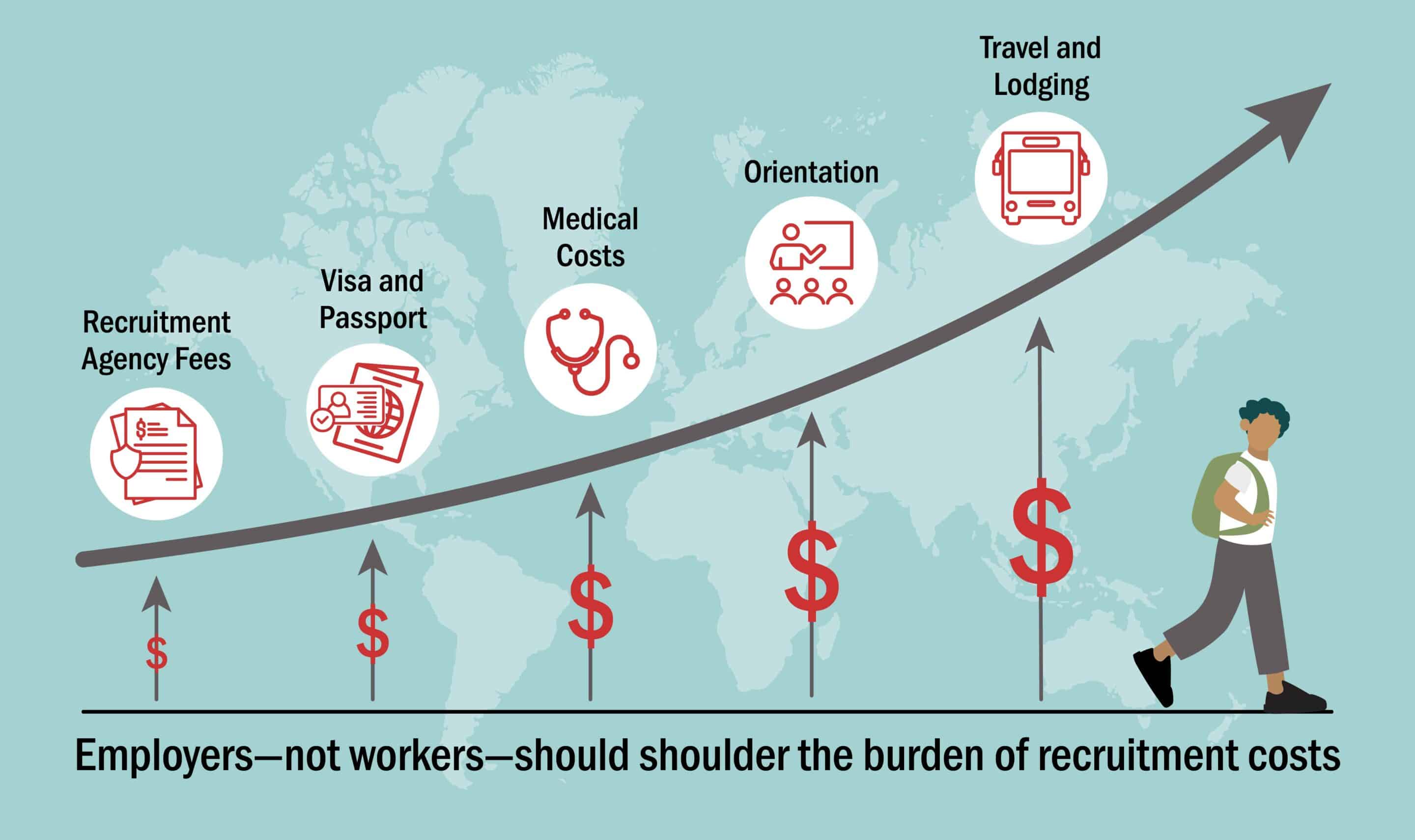
Until employers pay recruitment costs, debt bonded forced labor will persist.
Verite’s analysis of thousands of recent recruitment transactions between employers and labor recruiters in high-risk labor migration corridors into the Southeast Asia, Middle East, and Gulf Cooperation Council regions finds that fewer than 10% of employers are recruiting workers ethically by paying the full cost of recruitment and preventing workers from being charged for their job1. Separate Verité research in the electronics industry in Malaysia finds that up to 90% of migrant workers continue to shoulder the burden of financing their recruitment2, thereby subsidizing their employers and creating situations of extreme vulnerability to forced labor.
For the estimated 170 million migrant workers in the world at any one time, borrowing money to pay recruitment fees and costs to secure employment exposes them to debt bondage risks – the most pervasive and entrenched form of forced labor in global supply chains. While emerging “No Fees to Workers” industry commitments and company policies are undeniably a step in the right direction, without a parallel, express, and enforceable “Employer Pays” obligation, recruitment-related debt bonded forced labor in global supply chains will persist. So too, will the need to provide workers remedy, in the form of repayment, for the exploitation they endure when forced to pay fees to access employment.
Record-breaking recruitment fee repayments have become commonplace headlines in news coverage of migrant worker issues around the world. In many cases, the companies at the center of these remediation programs made prior commitments to preventing worker-paid fees in their operations or supply chains. While repayment and remedy constitute an important pillar of the United Nations Guiding Principles on Business and Human rights, the reliance on repayments as a form of due diligence is a worrying private sector trend. The focus on repayments blurs the lines between due diligence and remedy on the issue of ethical recruitment and undermines the concept of responsible business conduct.
Repayment is Remedy, not Responsibility
Repayment of worker-paid recruitment costs is a complicated and imperfect form of remedy to implement which can take months to plan before workers are repaid, typically based on the average fees paid by cohorts of workers. In the meantime, those workers continue working under conditions of forced labor. If employers are not paying for recruitment costs directly and upfront, workers will continue to need to borrow to pay for their recruitment, thereby subsidizing their employer and increasing their exposure to debt bondage. Repayment must not become a substitute for proactively embedding ethical recruitment in company operations and supply chains and implementing effective risk controls. Industry and company commitments, codes, and standards must impose a positive obligation on employers to pay necessary and legitimate recruitment-related fees and costs upfront in accordance with the International Labour Organization definition and prohibit the charging of recruitment costs to workers and repay workers if they are charged. Implementation guidance should also cover how to effectively implement Employer Pays as a core tenet of ethical recruitment.
Where do we go now?
In the context of recruitment fees and related costs, Verité’s guidance to employers on ethical recruitment of foreign migrant workers is focused on three actionable principles that should be reflected in commercially enforceable service agreements:
- The employer pays necessary and legitimate recruitment fees and related costs directly to relevant government authorities, service providers, and labor recruiters, or by timely reimbursing duly appointed labor recruiters that paid legitimate, necessary, and approved recruitment costs on behalf of the client employer.
- Workers are not charged recruitment fees or related costs by any party during the recruitment process irrespective of the manner, timing, or location of their imposition or collection.
- If foreign migrant workers are legally required to directly pay certain fees or costs connected to their recruitment prior to their departure from their country of origin, the workers should be reimbursed in full by their employer within 30 days of commencing their employment.
These principles are designed to reaffirm employer accountability for paying the full cost of recruitment and clearly prohibit the charging of fees to workers by labor recruiters or other intermediaries. It does mean that employers will need to identify and pay for the actual recruitment fees and costs by labor migration corridor, negotiate with labor recruiters for fair compensation for their services, and implement controls to ensure workers are not also being charged.
When employers verifiably pay the cost of recruiting foreign migrant workers it reduces the cost of recruitment because agents cannot get away with charging employers the fees they charge workers. Hence, the actual cost of recruitment and the risk of debt bonded forced labor diminishes due to the employers’ market power. As a result, complex and costly repayment programs are consigned to their appropriate function as remedy. When practices catch up with policies, the decades-long norm of saddling workers with recruitment costs and debt will be eradicated—and a leading cause of forced labor along with it.
About the Author
Declan Croucher, Chief Commercial Officer of Verité, has spent more than 10 years assisting companies and their advisors detect, remedy, and prevent forced labor, human trafficking, and modern slavery in their global supply chains.
[1] Analysis is based on data from Verité’s CUMULUS Forced Labor Screen™ platform, which screens cross-border labor supply chains for the presence of debt bonded risk and other ILO forced labor indicators.
[2] Data is from unpublished research conducted in 2019 on the recruitment corridor for the electronics industry in Malaysia.